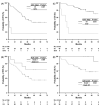Proton Beam Therapy for Treatment-Naïve Hepatocellular Carcinoma and Prognostic Significance of Albumin-Bilirubin (ALBI) Grade
- PMID: 36139604
- PMCID: PMC9497120
- DOI: 10.3390/cancers14184445
Proton Beam Therapy for Treatment-Naïve Hepatocellular Carcinoma and Prognostic Significance of Albumin-Bilirubin (ALBI) Grade
Abstract
To evaluate the efficacy of proton beam therapy (PBT) as an initial treatment in treatment-naïve hepatocellular carcinoma (HCC) patients and to assess the prognostic significance of albumin-bilirubin (ALBI) grade, 46 treatment-naïve HCC patients treated with PBT were analyzed. The ALBI grade distribution was grade 1 in 11 (23.9%) patients, grade 2 in 34 (73.9%) patients, and grade 3 in 1 (2.2%) patient. The median duration of follow-up was 56.5 months (95% confidence interval [CI], 48.2−64.7). Among the 46 patients, disease progression was observed in 23 (50%) patients: local progression in 3 (6.5%) patients; intrahepatic progression in 22 (47.8%); and extrahepatic progression in 5 (10.9%). The 5-year freedom from local progression (FFLP), progression-free survival (PFS), and overall survival (OS) rates were 92.7% (95% CI, 84.7−100.7), 43.3% (95% CI, 28.2−58.4), and 69.2% (95% CI, 54.9−83.5), respectively. In multivariate analysis, there were no independent factors for FFLP (p > 0.05 each), but tumor stage and ALBI grade were independent factors for PFS and OS (p < 0.05 each). PBT could result in comparable OS in treatment-naïve HCC patients to other recommended first-line treatments, and ALBI grade, in addition to tumor stage, could be useful for predicting OS.
Keywords: albumin-bilirubin; hepatocellular carcinoma; overall survival; proton beam therapy; radiotherapy.
Conflict of interest statement
All authors declare no conflict of interest.
Figures


References
-
- Kudo M., Kawamura Y., Hasegawa K., Tateishi R., Kariyama K., Shiina S., Toyoda H., Imai Y., Hiraoka A., Ikeda M., et al. Management of Hepatocellular Carcinoma in Japan: JSH Consensus Statements and Recommendations 2021 Update. Liver Cancer. 2021;10:181–223. doi: 10.1159/000514174. - DOI - PMC - PubMed
-
- Marrero J.A., Kulik L.M., Sirlin C.B., Zhu A.X., Finn R.S., Abecassis M.M., Roberts L.R., Heimbach J.K. Diagnosis, Staging, and Management of Hepatocellular Carcinoma: 2018 Practice Guidance by the American Association for the Study of Liver Diseases. Hepatology. 2018;68:723–750. doi: 10.1002/hep.29913. - DOI - PubMed
Grants and funding
LinkOut - more resources
Full Text Sources

